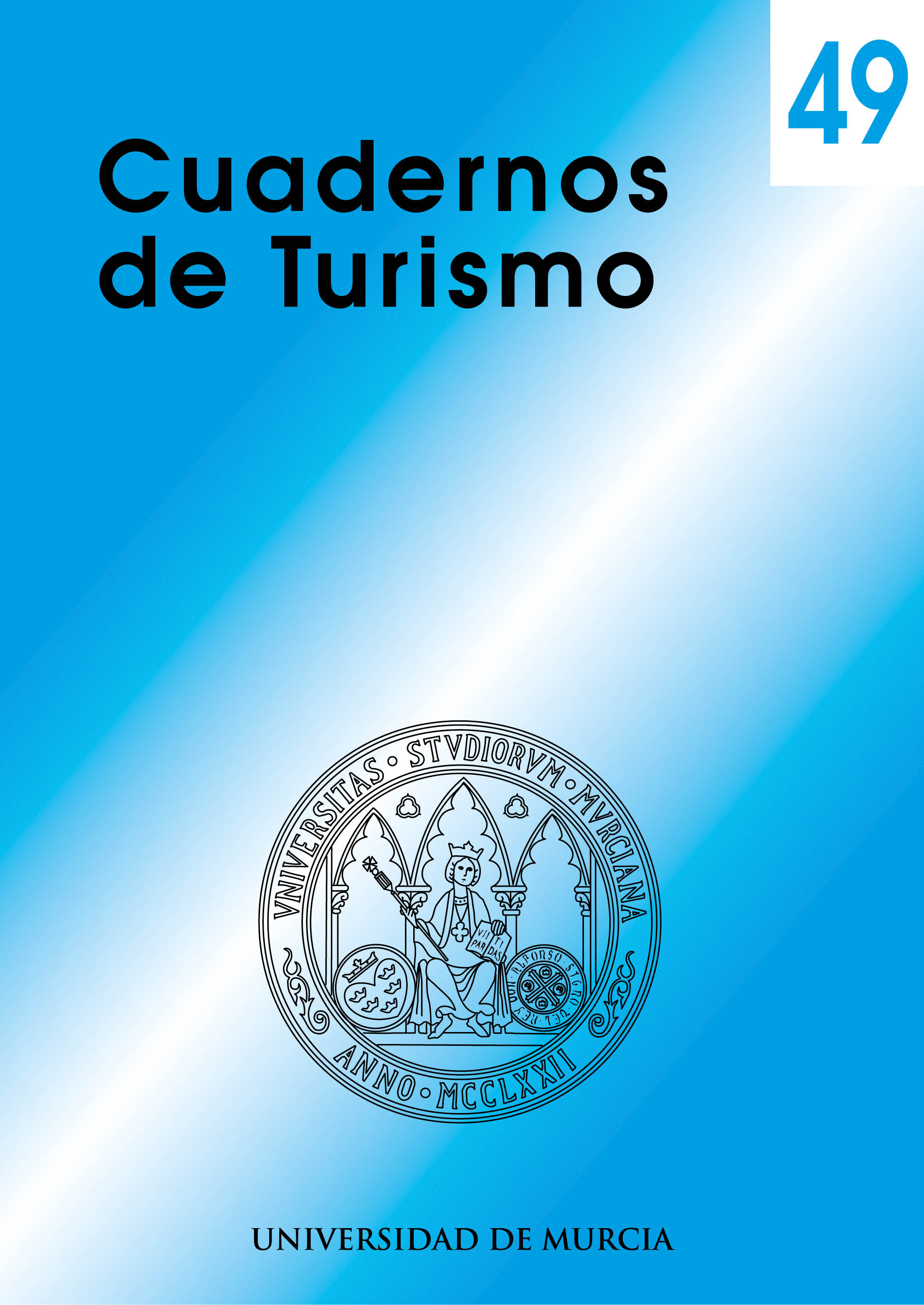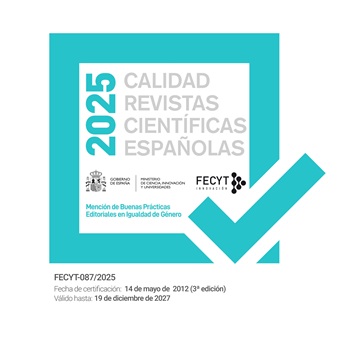BARRERAS Y OPORTUNIDADES PARA LA INSERCIÓN LABORAL DE LAS PERSONAS CON DISCAPACIDAD EN EL SECTOR TURÍSTICO DE LA PROVINCIA DE ALICANTE
Resumen
Partiendo de los presupuestos teóricos del turismo inclusivo, este estudio identifica las barreras y las oportunidades para la inserción laboral de las personas con discapacidad en el sector turístico de la provincia de Alicante (España). A tal fin, se recurre a una metodología cualitativa, con datos generados a partir de 34 entrevistas semiestructuradas realizadas a distintos colectivos del sector. Los resultados revelan la existencia de prejuicios y desinformación, pero también de oportunidades, que pueden contribuir a mejorar el diseño de estrategias empresariales y políticas públicas.
Descargas
-
Resumen2651
-
PDF (ESPAÑOL)2117
-
PDF (INGLÉS) 2117
Citas
ARBELÁEZ, M. y ONRUBIA, J. (2014): «Análisis bibliométrico y de contenido. Dos metodologías complementarias para el análisis de la revista colombiana Educación y Cultura», Revista de Investigaciones UCM, vol. 23 (14), pp. 14-31. http://dx.doi.org/10.22383/ri.v14i1.5
BAUM, T. (2015): «Human resources in tourism: Still waiting for change? A 2015 reprise», Tourism Management, vol. 50, pp. 204-212. https://doi.org/10.1016/j.tourman.2015.02.001
BAUM, T. (2018): «Sustainable human resource management as a driver in tourism policy and planning: A serious sin of omission? », Journal of Sustainable Tourism, vol.6 (26), pp. 873-889. https://doi.org/10.1080/09669582.2017.1423318
BENGISU, M. y BALTA, S. (2011): «Employment of the workforce with disabilities in the hospitality industry», Journal of Sustainable Tourism, vol. 19, pp. 35-37. https://doi.org/10.1080/09669582.2010.499172
CHI-GENG QING, C. y QU, H. (2003): «Integrating persons with disabilities into the work force: A study on employment of people with disabilities in foodservice industry», International Journal of Hospitality and Tourism Administration, vol. 4, pp. 59-83. https://doi.org/10.1300/J149v04n04_04
CLEMENTE SOLER, J.A., BOTE DÍAZ, M. y SÁNCHEZ VERA, P. (2018): «El turismo social accesible como nuevo modelo turístico», Cuadernos de Turismo, no 41, pp. 139-159. https://doi.org/10.6018/turismo.41.326981
COMISIÓN EUROPEA (2019): Informe sobre España 2019, con un examen exhaustivo en lo que respecta a la prevención y la corrección de los desequilibrios macroeconómicos. Bruselas: CE. Disponible en https://ec.europa.eu/info/sites/info/files/file_import/2019-european-semester-country-report-spain_es.pdf
CONDE, F. (2009): Análisis sociológico del sistema de discursos. Madrid, CIS.
CRUE (2017): Formación Curricular en Diseño para Todas las Personas en Turismo. Madrid, Fundación ONCE/Vía Libre.
DARCY, S. y PEGG, S. (2011): «Towards strategic intent: Perceptions of disability service provision amongst hotel accommodation managers», International Journal Hospitality Management, vol. 30, pp. 468-476. https://doi.org/10.1016/j.ijhm.2010.09.009
DARUWALLA, P. y DARCY, S. (2005): «Personal and societal attitudes to disability»,enAnnals of Tourism Research, vol. 32 (3), pp. 549-570. https://doi.org/10.1016/j.annals.2004.10.008
FERREIRA, M. A. (2010): «De la minus-valía a la diversidad funcional: un nuevo marco teórico-metodológico», Política y Sociedad, vol. 47 (1), pp. 45-65.
GILLOVIC, B. y MCINTOSH, A. (2020): «Accessibility and Inclusive Tourism Development: Current State and Future Agenda», Sustainability, vol. 12 (22). https://doi.org/10.3390/su12229722
GONZÁLEZ VELASCO, D.J. (Coord.). (2008): El mercado potencial del turismo accesible para el sector turístico español. Madrid, Ministerio de Industria, Comercio y Turismo.
GRÖSCHL, S. (2005): «Persons with disabilities: A source of non-traditional labour for Canada’s hotel industry», Cornell Hospitality Quarterly, vol. 46, pp. 258-274. https://doi.org/10.1177/0010880404273935
GRÖSCHL, S. (2007): «An exploration of HR policies and practices affecting the integration of persons with disabilities in the hotel industry in major Canadian tourism destinations», International Journal of Hospitality Management, vol. 26 (3), pp. 666-86. https://doi.org/10.1016/j.ijhm.2006.05.007
HERNÁNDEZ GALÁN, J. (Dir.) (2017): Observatorio de accesibilidad universal del turismo en España. Madrid, Fundación ONCE.
HOUTENVILLE, A. y KALARGYROU, V. (2012): «People with Disabilities: Employers’ Perspectives on Recruitment Practices, Strategies, and Challenges in Leisure and Hospitality», Cornell Hospitality Quarterly, vol. 53 (1), pp. 40-52. https://doi.org/10.1177/1938965511424151
HOUTENVILLE, A. y KALARGYROU, V. (2015): «Employers’ Perspectives about Employing People with Disabilities: A Comparative Study across Industries», Cornell Hospitality Quarterly, vol. 56 (2), pp. 168-179. https://doi.org/10.1177/1938965514551633
INSTITUTO NACIONAL DE ESTADÍSTICA. INE (2019): Estructura y dinamismo del tejido empresarial en España. Directorio Central de Empresas (DIRCE) a 1 de enero de 2019. Disponible en https://www.ine.es/prensa/dirce_2019.pdf
INSTITUTO NACIONAL DE ESTADÍSTICA. INE (2020): El Empleo de las Personas con Discapacidad (EPD). Año 2019. Disponible en https://www.ine.es/prensa/epd_2019.pdf
JASPER, C.R. y WALDHART, P. (2013): «Employer attitudes on hiring employees with disabilities in the leisure and hospitality industry: Practical and theoretical implications», International Journal of Contemporary Hospitality Management, vol. 25 (4), pp. 577-594. https://doi.org/10.1108/09596111311322934
KALARGYROU, V., BARBER, N.A. y KUO, P.J. (2018): «The impact of disability on guests’ perceptions of service quality delivery in the hospitality industry», International Journal of Contemporary Hospitality Management, vol. 30 (12), pp. 3.632-3.655. https://doi.org/10.1108/IJCHM-06-2017-0362
KALARGYROU, V., TRIVELLAS, P. y SIGALA, M. (2020): «Guests’ stereotyping and quality evaluations of service delivered by employees with disabilities: does service failure matter?», Asia Pacific Journal of Tourism Research, vol. 25 (7), pp. 748-765. https://doi.org/10.1080/10941665.2020.1769697
KALARGYROU, V. y VOLIS, A.A. (2014): «Disability Inclusion Initiatives in the Hospitality Industry: An Exploratory Study of Industry Leaders», Journal of Human Resources in Hospitality & Tourism, vol. 13 (4), pp. 430-454. http://dx.doi.org/10.1080/15332845.2014.903152
KAYE, H.S., JANS, L.H. y JONES, E.C. (2011): «Why don’t employers hire and retain workers with disabilities?», Journal of occupational rehabilitation, vol. 21 (4), pp. 526-536.
MANTECÓN, A. (2008): La experiencia del turismo. Un estudio sociológico sobre el proceso turístico-residencial. Barcelona, Icaria.
MANTECÓN, A. y HUETE, R. (2021): «Posiciones políticas sobre el derecho al turismo», Recerca. Revista de Pensament i Anàlisi, vol. 26 (1), pp. 33-58.
MARCOS, D. y GONZÁLEZ, D. (2003): Turismo accesible. Hacia un turismo para todos. Madrid, CERMI.
MARTÍNEZ-GAYO, G. y MARTÍNEZ QUINTANA, V. (2020): «Precariedad laboral en el turismo español bajo la perspectiva de género», Pasos. Revista de Turismo y Patrimonio Cultural, vol. 18 (4), pp. 649-665.
MARRERO, J.R. (2014): «La sobrecualificación en el sector turístico: el caso español (1987 2011)», Cuadernos de Relaciones Laborales, vol. 33 (1), pp. 149 168. https://doi.org/10.5209/rev_CRLA.2015.v33.nl.48811
MARRERO, J.R. y HUETE, R. (2013): «La opinión pública sobre el empleo turístico en la Comunidad Valenciana», Cuadernos de Turismo, no 32, pp. 189-206.
MCCARY, K. (2005): «The disability twist in diversity: Best practices for integrating people with disabilities into the workforce». Diversity Factor, vol. 13 (3), pp. 16-22.
MCINTOSH, A. y HARRIS, C. (2018): «Representations of hospitality at The Special Needs Hotel», International Journal of Hospitality Management, vol. 75, pp. 153-159. https://doi.org/10.1016/j.ijhm.2018.05.021
MOONEY, S. (2018): «Jobs for the girls? Women’s employment and career progression in the hospitality industry», en R. Burke & J. M. Christensen Hughes (Eds.), Handbook of hospitality human resource management. Londres, Edward Elgar Publishing, pp. 184-215.
MIETHLICH, B. y OLDENBURG, A.G. (2019): «How Social Inclusion Promotes Sales: An Analysis of the Example of Employing People with Disabilities», Journal of Marketing Research and Case Studies, vol. 2019. https://doi.org/10.5171/2019.463316
OBSERVATORIO ESTATAL DE LA DISCAPACIDAD (2020): Base Estatal de Datos de Personas con Valoración del Grado de Discapacidad. Año 2018. Disponible en https://www.imserso.es/InterPresent2/groups/imserso/documents/binario/bdepcd_2018.pdf
OLAZ CAPITÁN, A. y ORTIZ GARCÍA, P. (2020): «Discapacidad y emprendimiento. Un estudio cualitativo desde una perspectiva competencial», RIO: Revista Internacional de Organizaciones, no 24, pp. 42-62. https://doi.org/10.17345/rio24.41-62
ONU (2018): Disability and Development Report. Nueva York, Organización de las Naciones Unidas.
ORGANIZACIÓN INTERNACIONAL DEL TRABAJO (OIT) (2017): Pautas de la OIT sobre trabajo decente y turismo socialmente responsable. Disponible en www.ilo.org
ORGANIZACIÓN MUNDIAL DEL TURISMO (2020): Directrices de la OMT para una recuperación inclusiva – Impactos socioculturales de la COVID-19, Tema 1: Personas con discapacidad. https://doi.org/10.18111/9789284422418
PAEZ, P. y ARENDT, S.W. (2014): «Managers’ attitudes towards people with disabilities in the hospitality industry», International Journal of Hospitality & Tourism Administration, vol. 15, pp. 172-190. https://doi.org/10.1080/15256480.2014.901065
PÉREZ, M.E. y CHHABRA, G. (2019): «Modelos teóricos de discapacidad: un seguimiento del desarrollo histórico del concepto de discapacidad en las últimas cinco décadas», en Revista Española de Discapacidad, vol. 7 (1), pp. 7-27. https://doi.org/10.5569/2340-5104.07.01.01
PORTO, N. y RUCCI, A.C. (2019): «Accesibilidad en turismo: diagnóstico, voluntad política y acciones», Estudios y Perspectivas en Turismo, vol. 28 (4), pp. 1.032-1.062.
PRINS, R. (2013): «Sickness Absence and Disability: An International Perspective», en Loisel P. y Anema J. (Eds.) Handbook of Work Disability. Nueva York, Springer. https://doi.org/10.1007/978-1-4614-6214-9_1
SERVICIO PÚBLICO DE EMPLEO ESTATAL-SEPE (2019): Informe del Mercado de Trabajo de las Personas con discapacidad. Estatal. Datos 2018. Disponible en https://cpage.mpr.gob.es/
SCHEYVENS, R. y BIDDULPH, R. (2018): «Inclusive tourism development», en Tourism Geographies, vol. 20 (4), pp. 589-609. https://doi.org/10.1080/14616688.2017.1381985
VORNHOLT, K., VILLOTTI, P., MUSCHALLA, B., BAUER, J., COLELLA, A., ZIJLSTRA, F., VAN RUITENBEEK, G., UITDEWILLIGEN, S. y CORBIÈRE, M. (2017): «Disability and employment – overview and highlights», European Journal of Work and Organizational Psychology, vol. 27 (1), pp. 40-55. https://doi.org/10.1080/1359432X.2017.1387536
Las obras que se publican en esta revista están sujetas a los siguientes términos:
1. El Servicio de Publicaciones de la Universidad de Murcia (la editorial) conserva los derechos patrimoniales (copyright) de las obras publicadas, y favorece y permite la reutilización de las mismas bajo la licencia de uso indicada en el punto 2.
2. Las obras se publican en la edición electrónica de la revista bajo una licencia Creative Commons Reconocimiento-NoComercial-SinObraDerivada 3.0 España (texto legal). Se pueden copiar, usar, difundir, transmitir y exponer públicamente, siempre que: i) se cite la autoría y la fuente original de su publicación (revista, editorial y URL de la obra); ii) no se usen para fines comerciales; iii) se mencione la existencia y especificaciones de esta licencia de uso.
3. Condiciones de auto-archivo. Se permite y se anima a los autores a difundir electrónicamente las versiones pre-print (versión antes de ser evaluada) y/o post-print (versión evaluada y aceptada para su publicación) de sus obras antes de su publicación, ya que favorece su circulación y difusión más temprana y con ello un posible aumento en su citación y alcance entre la comunidad académica. Color RoMEO: verde.





_.jpg)









